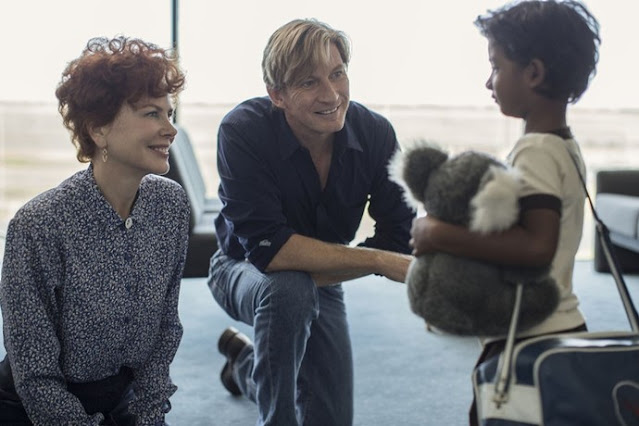I am a sucker for the heart-warming personal dramas that are designed to bring tears to the eyes with their emotional stakes and manufactured endings that demand you be moved by the lead character’s journey. Those types of films, when made well, hit me in a way no other type of film can. The best of the best of these are the ones that are based on real events because that adds an additional element into the mix when I realize that the drama I am viewing actually happened and is not just some clever idea in the mind of a screenwriter bucking for some Oscar clout.
In late 2016 I began hearing whispers about this new film that was a guarantee for that year’s Academy Awards, starring a young actor who I knew from his previous Academy Awards show darling Slumdog Millionaire, Dev Patel. The story for this film came from an autobiography by Saroo Brierley, an India-born Aussie who was separated from his family and adopted by an Australian couple and raised thousands of miles away from home. The book tells the story of how he found his birth home and family again despite the insane odds against him and was the type of feel-good drama that I am absolutely the target audience for.
Eventually I found a copy of the film and was able to experience this amazing story for myself. To say I was moved by it is an understatement. But films come and go and it wasn’t long before I had moved on and I never got around to revisiting it again, until today. Still, as I watched Lion again, I remembered it beat for beat and the emotions came flooding back again. This film is just as powerful today as it was eight years ago. The human drama is relatable and the story is such that, whether you were adopted or not, you could understand the feelings Saroo was going through as a young child and his later drive to find his family again.
It is those personal, basic human emotions that overcome all cultural differences, all racial divides, and bind us together as fellow humans on this planet. As we watch young Saroo, lost in a country that doesn’t speak the same language as he does, we can understand the fear and confusion that he feels. Part of that is Sunny Pawar, who, as young as he is, is perfectly cast in a role that he mostly has no one to play off of. For a good part of this story, he is carrying the weight of it. That’s not easy to do for a seasoned actor, let alone a very young child. Sunny is so good that when we flash forward in time and Dev Patel takes over as the adult Saroo, as good as he is as an actor, the film loses a lot of steam. It only recovers from that when we get to the finale, which more than makes up for the stumbling block that is the middle act.
The film opens up by setting the stage for Saroo’s life at home in a small village in Khandwa, India. His father has abandoned the family, and his mother, no longer able to afford schooling for her children, has gone to work in manual labor, hauling rocks. During the day, Guddu, the older brother, and Saroo steal coal from the freight trains to trade for milk and food. One evening, Guddu is leaving to work overnight at a nearby train station. Saroo convinces him to take him along, but once there, he falls asleep on a bench and, upon awakening, can’t find his brother. He searches for him on an empty train, reasoning that Guddu will come back to the train once it is time to go home, but, still tired, he falls asleep again only to awaken with the train in motion. He is only able to finally get off the train once it has traveled for several days, and he finds himself in faraway Calcutta, where he doesn’t understand the language and is unable to communicate where it is he came from.
After a close call with a local woman who seems friendly but has nefarious motives, Saroo is eventually sent to an orphanage and later adopted by Sue (Nicole Kidman) and John Brierley (David Wenham), a couple from Australia who have chosen not to have children of their own and instead adopt. They later adopt a second Indian child, Mantosh, but he has some emotional issues and is prone to self-harm. The film flashes forward twenty years to when Saroo is now grown and moves to Melbourne to study hotel management. He has also started a relationship with an American student, Lucy (Rooney Mara). During a gathering with some Indian friends, he is overwhelmed with his memories of his childhood and reveals to the group about how he was lost and adopted. It is suggested that he may be able to retrace that journey on Google Maps, using math to narrow the distance traveled down, and rediscover the home he has lost all those years ago.
Many of us who have discovered the wonders of Google Earth or Google Maps have gone back and looked up childhood homes, schools, playgrounds, and other places we no longer live and revisited memories long since past. I remember tracing the route I used to walk from elementary school to my home and being shocked that it was less than a mile; it seemed like so much more to my younger self. I, of course, had the benefit of knowing the name of my childhood town as well as my old address to go off of. I could not imagine trying to find those places based on some distant childhood memories from forty years ago without any city names, just looking at the land on Maps and trying to find familiar landmarks. It took Saroo six years to find home, keeping his search to himself to avoid upsetting his adoptive mother as well as to avoid the good-intentioned, but unhelpful, suggestions that would inevitably be offered. As it turns out, while he was right about avoiding the offers for assistance, focusing on a meticulous, but lengthy, process of his own, he was wrong about upsetting his mother. When he finally revealed to her what he had been working on for all those years, she was supportive and excited about the news that he had found home.
As I mentioned above, the beginning and the ending of this film are excellent and emotional. Unfortunately, once Saroo grows up, the entire film goes off the rails as we get extended sequences that are really not all that interesting. Saroo spends a good portion of the second act moping around and looking depressed. Rooney Mara enters the picture as his girlfriend, but this is a thankless role as she is relegated to the generic girlfriend part that gets no development whatsoever. The idea of searching Google Maps for Saroo’s home is interesting, but the way it is depicted on screen isn’t. Dev Patel is also relegated to nothing more than looking sad and aloof. This is not the actor’s fault; he’s simply not given much to work with here.
Once we get past this act and move on to the finale, the film picks up in a big way, and it is here where Dev Patel gets to show off his range and earn that acting Oscar nomination. When he arrives in his home village and sees his mother for the first time in decades, the range of emotions flooding his face are intense and recognizable. Even more impressive, though, is the sorrow that follows when he hears of what happened to his brother, Guddu, and why he never came back for Saroo at the station that day. There is so much going on during this scene, and all of it will bring tears to your eyes. It makes the frustrating second act worth sitting through.
Lion is a powerful film about the real-world story of Saroo Brierley. But it is more than that, too. It is also a call for assistance for the more than 80,000 children that go missing in India every year. The film ends with a message about all these lost children and the great effort that goes into trying to reunite these children with their families. That is a lot of broken families, most of which will not have the happy ending that Saroo got. The real Saroo Brierley wrote the autobiography partly as a way to bring to light this real-world problem and promote the options people have to support the effort to reunite families. He also went on to various news programs when the film was being released to promote these programs. His efforts have helped raise awareness of these issues and generated more support for these institutions. The best kinds of biographical films are the ones that can not only make you feel the plight of the protagonist but also bring to light things that need to be addressed and generate support for a worthy cause. Lion does both of these really well, and though it is not the best film to be released in 2016; it deserved its spot amongst the best.
Academy Award Nominations:
Best Picture: Iain Canning, Angie Fielder, and Emile Sherman
Best Supporting Actor: Dev Patel
Best Supporting Actress: Nicole Kidman
Best Adapted Screenplay: Luke Davies
Best Cinematography: Greig Fraser
Best Original Score: Dustin O’Halloran and Hauschka
____________________________________________________
Release Date: January 20, 2017
Running Time: 118 minutes
Rated PG-13
Starring: Dev Patel, Sunny Pawar, Rooney Mara, David Wenham, and Nicole Kidman
Directed by: Garth Davis









Comments
Post a Comment